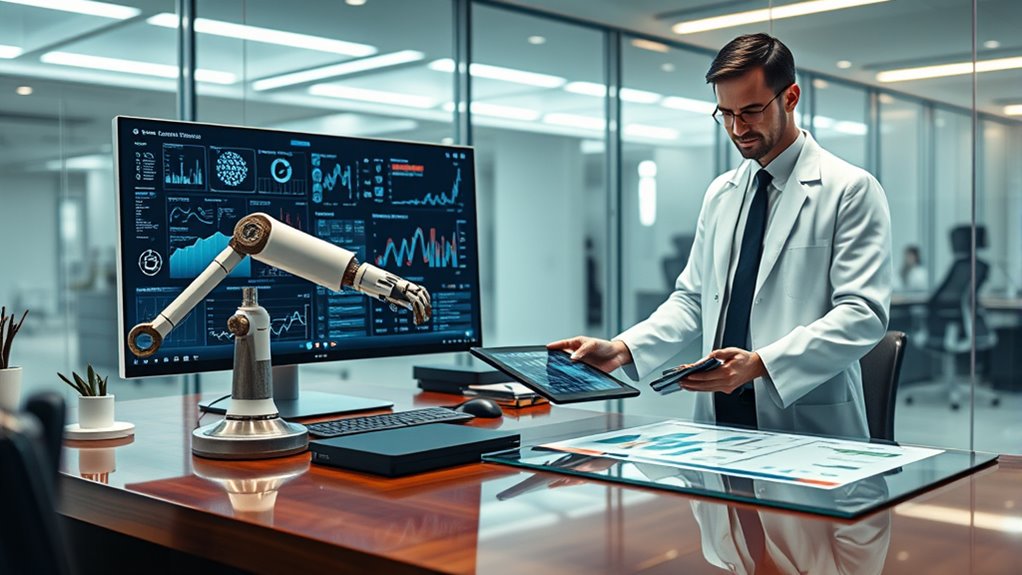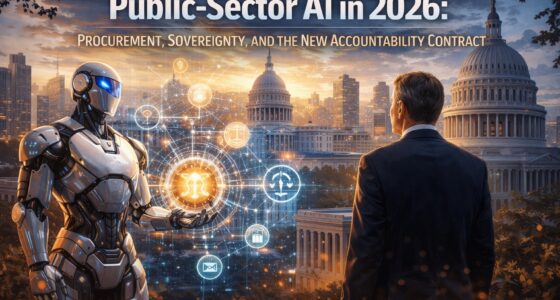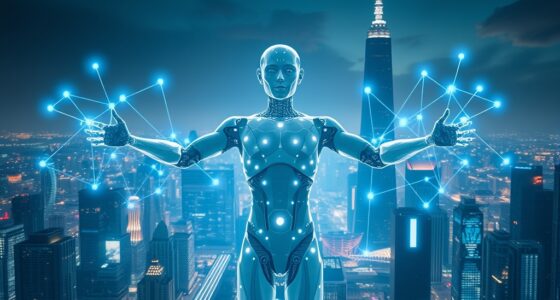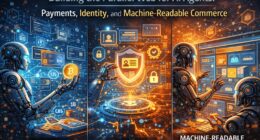AI is rapidly transforming professions like law and medicine, making even highly skilled roles vulnerable to automation. Tasks once done manually, like legal research or diagnostics, are now handled by intelligent tools, reducing the need for entry-level roles and changing career paths. To stay relevant, you’ll need to develop new skills, focus on problem-solving, and adapt as technology reshapes your industry. Keep going to discover how to navigate these shifts effectively.
Key Takeaways
- AI tools now perform complex legal research, analysis, and document drafting, reducing reliance on junior lawyers and paralegals.
- Diagnostic imaging, genetic analysis, and personalized treatment planning are increasingly automated in healthcare.
- Routine legal and medical tasks are being replaced by AI, shrinking entry-level roles and transforming traditional career pathways.
- Continuous AI advancements enable machines to handle decision-making, challenging the notion that only humans can perform these tasks.
- Ethical concerns and skill gaps emphasize the need for professionals to adapt, as AI’s capabilities expand across white-collar fields.
Top picks for "white collar automation"
Open Amazon search results for this keyword.
As an affiliate, we earn on qualifying purchases.
The Rise of AI in Legal Practices

The rise of AI in legal practices is transforming how lawyers work and serve clients. Adoption rates have nearly tripled from 11% in 2023 to 30% in 2024, with larger firms leading the way—46% of those with over 100 attorneys use AI, compared to just 18% of solo practitioners. Mid-sized firms have also seen growth, with 30% now using AI tools, up from 11%. Solo practitioners, once hesitant, have increased their adoption to 18%, and 74% of legal professionals expect to use AI-driven tools within the next year. AI’s benefits include enhanced efficiency, workload management, accuracy, and cost savings. This rapid growth signals AI’s automation in business role in shaping the future of legal services, making it a competitive advantage for firms that adopt early. As AI becomes more integrated into professional workflows, the landscape of legal practice is poised for significant change, especially as it intersects with innovative technologies such as legal research platforms and contract analysis tools. Moreover, the integration of AI in legal processes also raises important considerations regarding ethical hacking to ensure data security and compliance.
Automation Transforming Medical Services

Automation is revolutionizing medical services by making diagnoses faster and more accurate through AI tools that analyze images and genetic data. It also personalizes treatments by predicting patient responses and creating tailored care plans. Additionally, AI streamlines administrative tasks, reducing paperwork and freeing up healthcare providers to focus more on patient care. AI adoption is widespread among healthcare organizations globally, further accelerating these transformative changes. The integration of advanced medical imaging analysis capabilities allows for earlier detection of diseases, improving patient outcomes. Moreover, the use of automated diagnostic tools enhances the precision of medical assessments, leading to more effective treatments. Incorporating air quality improvement technologies in healthcare settings can also contribute to better patient recovery environments. As these technologies advance, they contribute to more efficient patient management and optimized healthcare workflows. Embracing technological innovation is essential for healthcare providers aiming to stay ahead in this rapidly evolving landscape.
AI Diagnoses and Treatment
AI is revolutionizing medical services by providing highly accurate and faster diagnoses, which helps healthcare professionals deliver better patient outcomes. AI-powered tools for cancer detection now match expert assessments 93% of the time, making diagnoses more reliable. These systems analyze complex data patterns in radiology and pathology, improving accuracy and efficiency. AI also delivers results quicker than traditional methods, reducing wait times and streamlining workflows. Cost-effective and scalable, AI diagnostics lower healthcare costs while expanding access. With 80% of hospitals adopting AI to enhance diagnostics, and a market projected to reach over $431 billion by 2032, AI’s role continues to grow. Healthcare AI market This transformation enhances patient care, supports personalized medicine, and pushes healthcare toward more precise, timely, and affordable solutions. Integrating digital health tools like AI-driven diagnostic systems is also helping to bridge gaps in healthcare equity. Moreover, the integration of personality assessment techniques can improve patient-provider communication, leading to more tailored treatment plans. Additionally, advancements in aura visualization and imaging technologies are beginning to offer new insights into emotional and energy states, further enriching diagnostic capabilities. Furthermore, improvements in noise levels of modern heat pumps are making indoor environments more comfortable, which can positively impact patient recovery environments in healthcare settings. Incorporating data interpretation skills is increasingly important for healthcare professionals to effectively utilize AI insights and improve clinical decision-making.
Automation in Medical Records
As the demand for efficient patient data management grows, healthcare providers are increasingly turning to automated systems to streamline medical records. Automation reduces admin burdens and improves accuracy, allowing you to access all-encompassing patient histories quickly. AI-driven tools handle coding, review, and data organization, saving time and minimizing errors. For instance, Banner Health migrated millions of records, saving 1.2 million hours. These systems also support interoperability, enabling seamless data exchange across platforms. Additionally, understanding the dream symbolism associated with various medical scenarios can offer insights into patient well-being and emotional states. The importance of air quality cannot be overstated, especially in clinical environments where maintaining optimal conditions is essential for patient safety and staff well-being. Proper maintenance of HVAC systems can enhance refrigeration cycle efficiency, ensuring a consistent and safe environment. Implementing these systems requires addressing data security concerns and ensuring compliance with regulations, which can be complex but is crucial for trust and safety. A thorough understanding of chevrolet tuning techniques can further optimize system performance and outcomes. However, challenges like data security, regulatory compliance, and integration remain. You’ll need proper training to adapt, but the benefits—faster workflows, better patient care, and cost savings—are clear. Automation is transforming how medical records support clinical decisions and overall healthcare efficiency.
Displacement of Entry-Level Professionals

You may notice that many entry-level roles, like analysts and junior lawyers, are disappearing due to AI automation. Companies are cutting back on beginner opportunities as routine tasks become automated. This shift makes it harder for newcomers to gain experience and enter these fields. According to recent industry reports, the trend is expected to accelerate as AI systems become more sophisticated and capable of handling complex tasks. Additionally, the integration of automation in the workforce is leading to a reevaluation of skill requirements across professional sectors. The rise of remote hackathons exemplifies how innovation is increasingly driven by virtual collaboration, which could further influence job dynamics in the future. As AI-driven tools continue to evolve, workforce adaptation strategies will be crucial for professionals seeking to stay relevant in their fields. Furthermore, insights from educational data mining can inform training programs to better prepare workers for shifting industry demands. Moreover, understanding performance tuning principles may inspire new approaches to optimizing human skills alongside automation.
Entry-Level Roles Eliminated
The rise of automation has led to significant reductions in entry-level roles across many industries. You’re likely to see fewer opportunities for beginners as AI takes over tasks once handled manually. Employers expect to cut workforces by up to 40% in roles where automation fits, especially in professional sectors. The U.S. Bureau of Labor Statistics reports a 20% drop in new job openings by early 2025, with AI projected to displace around 85 million jobs globally. Despite creating 97 million new roles, many won’t be entry-level. This shift narrows pathways into stable careers, forcing new entrants to compete harder. It also impacts salary expectations, as companies lean on AI-supported roles. The landscape is changing fast, making it harder to start and grow in white-collar professions. Additionally, the diverse designs of automated systems and tools are increasingly replacing manual tasks, further diminishing entry-level opportunities. The integration of headphones, as a common device in many professional settings, exemplifies how automation and technology are fundamentally changing workplace tools and expectations.
Reduced Opportunities for Beginners
Automation continues to reshape the job landscape, especially for entry-level professionals. Nearly 40% of employers plan to cut roles where AI can automate tasks, shrinking entry-level openings. AI-driven automation not only displaces jobs but also reduces the number of new roles created, making it harder for beginners to find their start. Many entry-level positions now require supporting AI skills, leaving traditional beginner roles scarce. Employers are lowering salary expectations for roles augmented by AI, discouraging newcomers. Additionally, offshoring to lower-cost countries increases competition for the few remaining domestic entry-level jobs. This disruption creates bottlenecks in talent pipelines, limits practical experience, and hampers social mobility. As opportunities shrink, early career professionals face greater challenges in gaining experience and advancing in their fields.
New Skills for a Changing Workforce

As AI continues to reshape white-collar work, developing new skills becomes essential for staying relevant in the evolving job landscape. You’ll need to focus on skills that complement automation, like creative problem-solving and critical thinking. The job market is shifting toward emerging industries centered around AI development and deployment, demanding specialized knowledge. Lifelong learning is now a must, with online courses, university programs, and apprenticeships helping you stay ahead. To adapt, you should also develop cross-sector skills and emotional intelligence, which are less likely to be automated. These abilities will help you leverage AI as an augmentation tool rather than a threat. Staying adaptable and continuously upgrading your skills ensures your career remains resilient amidst rapid technological change.
- Embrace lifelong learning through online platforms
- Develop skills in AI-related fields like data science
- Cultivate emotional intelligence and social skills
- Gain practical experience via apprenticeships
- Build transferable skills across industries
Economic Growth Amidst Job Losses

Despite widespread job losses in white-collar sectors, economic growth continues to accelerate thanks to soaring corporate profits and productivity gains driven by AI. Companies are squeezing more output from fewer employees, boosting profits even as hiring slows. GDP keeps rising, supported by AI-enabled efficiency improvements that rapidly transform industries. Roles like entry-level analysts and junior lawyers are vanishing, yet overall corporate earnings remain strong. This displacement creates a talent pipeline problem and intensifies global competition, especially as firms expand into regions like India for cheaper skilled labor. Interestingly, this shift isn’t driven by traditional recession factors but by AI’s disruptive impact. While AI is projected to create some jobs, the net effect is a paradox: economic expansion persists alongside significant white-collar job erosion.
The Global Impact of Generative AI

The rise of generative AI is reshaping industries and redefining how businesses operate worldwide. Its rapid adoption—from 33% in 2023 to 71% in 2024—shows just how quickly it’s transforming the global landscape. With around 60% of the world’s population expected to interact with AI by 2024, its influence is undeniable. The market is booming, projected to reach $66.62 billion by 2025 and $1.3 trillion by 2032. This growth fuels innovation, with tools like ChatGPT and Bard leading the charge. As AI integrates into sectors, it impacts economies, creates new opportunities, and challenges traditional work roles. You’ll see AI’s global footprint expand, shaping economies, job markets, and technological progress in ways previously unimaginable.
- Global AI interactions are nearing 2 billion users.
- AI-driven applications could replace entirely human-developed software.
- Investment in AI surpasses $33 billion annually.
- AI could add nearly $20 trillion to the world economy by 2030.
- Market growth is accelerating at a 46% annual rate.
Challenges and Opportunities in Legal Tech

What are the key challenges and opportunities shaping the future of legal tech today? Cybersecurity risks are a major concern as increased digital reliance exposes sensitive data to threats. Cost pressures can be significant, especially for smaller firms struggling to afford advanced tools. Adoption barriers, like resistance to change and limited IT infrastructure, slow progress. Staying compliant with evolving regulations adds complexity. However, these challenges open doors for innovation. Legal tech boosts efficiency by automating routine tasks, allowing you to focus on complex issues. It enhances accuracy and reduces errors, improving outcomes. New services and business models emerge, such as virtual law firms, expanding your reach globally. The market’s rapid growth, fueled by AI, blockchain, and cloud solutions, creates vast opportunities for those willing to adapt.
Adapting Medical Careers to AI Integration

As AI becomes increasingly integrated into healthcare, medical careers are evolving rapidly to incorporate new technologies and workflows. You’ll find AI assisting in diagnosis, surgery, and patient management, making healthcare more efficient and personalized. To stay relevant, you need to adapt by embracing these changes. Here are some ways AI is transforming medical roles:
- Using AI for pre-operative planning and robotic surgeries
- Relying on AI for accurate diagnostics and prognosis
- Leveraging AI for remote patient monitoring and engagement
- Incorporating AI-driven data analysis to improve treatment outcomes
- Addressing ethical challenges around patient data privacy and AI misuse
Strategies for Staying Relevant in an Automated World

In a world where automation continues to reshape industries, staying relevant requires proactive strategies that adapt to rapid technological changes. You should focus on upskilling and reskilling to keep your skills aligned with evolving demands. Embrace continuous learning—taking courses, earning certifications, and staying informed about industry trends—so you remain competitive. Redesign your role by integrating AI tools that enhance your productivity rather than replace you. Develop a diverse skill set that combines technical expertise with soft skills like critical thinking and problem-solving. Engage with organizations that prioritize employee development and job redesign. By proactively adapting, you position yourself as a “Superworker,” leveraging AI to augment your capabilities and stay indispensable in an increasingly automated job market.
Frequently Asked Questions
How Soon Will AI Fully Replace Lawyers and Doctors?
You’re wondering when AI will fully replace lawyers and doctors. While AI is transforming tasks like research, document review, and predictive analytics, full replacement isn’t likely soon. These professions require complex decision-making, empathy, and ethical judgment AI can’t replicate yet. Instead, AI will augment your work, helping you focus on high-value, nuanced aspects. Full automation remains a distant goal, with human oversight still essential for the foreseeable future.
What Ethical Concerns Arise From AI Replacing Human Professionals?
When AI replaces human professionals, ethical concerns surface, like risking confidentiality, bias, and accountability. You must ensure client data stays protected and that AI doesn’t reinforce discrimination. It’s essential to oversee AI outputs to maintain fairness and trust. You’re responsible for preventing misinformation and safeguarding your profession’s integrity. Balancing AI’s efficiency with ethical standards is critical to protect your clients, reputation, and the public’s trust.
Are There Specific Legal or Medical Fields Less Vulnerable to Automation?
Think of the legal and medical worlds as intricate tapestries woven with human touch and judgment. You find that fields like criminal law and complex diagnostics resist automation because they demand nuanced understanding and empathy. While routine tasks like document review and image analysis are more like open books for AI, the core of these professions—advising, diagnosing, caring—remains resilient, anchored in human insight that machines haven’t yet mastered.
How Can Educational Institutions Prepare Future Professionals for Ai-Driven Careers?
You can prepare future professionals for AI-driven careers by integrating AI literacy into their education. Focus on foundational concepts, data skills, and ethics early on. Use project-based learning with real-world AI tools, foster critical thinking, and promote continuous adaptation. Encourage interdisciplinary collaboration, offer internships, and keep curriculum updated with industry innovations. This approach guarantees they develop the problem-solving, oversight, and ethical skills needed in an AI-augmented workforce.
Will AI Create More Jobs Than It Displaces in White-Collar Sectors?
You might wonder if AI will create more jobs than it displaces in white-collar sectors. While AI does generate new roles, especially in tech and AI development, it also automates many existing tasks, leading to significant job losses. Overall, the balance depends on how quickly industries adapt and how effectively workers retrain. In many cases, AI’s displacement may outpace job creation, making the future uncertain for white-collar professionals.
Conclusion
As automation reshapes your career landscape, you might feel overwhelmed by job losses just as opportunities emerge. While AI replaces routine tasks, it also creates new roles demanding human ingenuity. Embrace change like a pioneer steering uncharted territory—balancing the risks with the rewards. In this new world, your adaptability becomes your greatest asset. So, don’t fear the shift; see it as a chance to reinvent yourself amid the inevitable march of progress.









